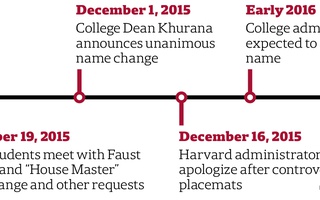When Faculty of Arts and Sciences Dean Michael D. Smith announced last week that House masters would be renamed Faculty Deans, the change was, for some, more than just a tweak to an administrative title.
For some faculty members and undergraduates, Harvard’s traditional “House master” title seemed an uncomfortable anachronism, associated—though not intentionally—with slavery. For others, the title was a distinctive piece of Harvard heritage, deriving its roots from medieval European universities and reinforcing the College’s academic tradition.
In an email to Harvard students and FAS affiliates announcing the change, Smith endeavored, in part, to reconcile both views and appease generations of Harvard alumni who had known their undergraduate house leaders as masters, not deans. {shortcode-4b80d15981a3675dc223a028b57ead840cbfc513}
While Smith endorsed the title change as important step towards creating a “transformative experience” for students, he recognized the historical and sentimental value the title might hold for alumni.
“Many alumni will remember House leaders as the Master of their beloved House, and they should have no qualms in doing so,” Smith wrote. “The term House Master is and will remain a part of the College’s long and proud history.”
The initial decision to change the title, announced last semester, prompted Eliot alumnus Dale A. Jenkins ’60 to write lengthy letters to Smith and William F. Lee ’72, the senior fellow of the Harvard Corporation, the University’s highest governing body. Jenkins argued that changing the House master title “would throw the entire position of house leadership into question. In addition, it would be a rejection of the cherished experiences of thousands.”
And one week after the new title was unveiled and promptly broadcast across national media outlets, some alumni are still grasping what they see as a needless encroachment on Harvard tradition. Former Winthrop House resident Laurence J. Gillis ’64 scoffed at the new name.
“I think it is an exquisitely sensitive response to a problem that simply was not there,” he said. “And, worse, it exposes Harvard to ridicule that it simply does not need, not now.”
Brett R. Angney ’71, a former Kirkland House resident, said he found the change unnecessary and unjustified. “I have a master’s degree—should that be a dean’s degree now?” he asked. “There are more important things to be concerned about with race relations than House masters. The first time I read about that I went, ‘You have got to be kidding.’”
But while alumni critics of the change have been more vocal on the comment boards, others—like former Pforzheimer resident tutor Jay Gabler—have embraced the new title.
“People outside Harvard are already going to have a hard time, in many ways, thinking of Harvard as a tolerant, accepting place that is anything but stuffy and stuck-up,” Gabler said. “So to come in and be mentioning this title of House master just adds to the negative impression some people have.”
Gabler, who wrote a blog post praising Harvard’s decision, said he believes the new Faculty Dean title comes closer to describing the responsibilities of the position. “The change has left me more impressed with Harvard, rather than less,” he said.
Jeannie Park ’83, a Leverett alumna and diversity advocate, agreed with Gabler and said she supports Harvard College Dean Rakesh Khurana in any effort to improve race relations on campus.
“There are a lot of very difficult issues that students, faculty, and administrators are struggling with, and I know Harvard has been trying to take the lead on many fronts in terms of discrimination,” Park said.
Harvard donor and former Eliot House resident Paul J. Zofnass ’69 said that he is warming to the change. While he said he initially had preferred the more traditional House master title, Zofnass eventually came to see Faculty Dean as preferable.
“If it somehow sends that message or suggests that this is part of Harvard culture to be sensitive to as many as minorities as possible, if that’s the message, then I am definitely in favor of it,” Zofnass said. “It is a good thing. It’s a very good thing.”
Prathama K. Nabi ’11, who lived in Winthrop, also said she found the title change encouraging, calling it a “launchpad to the bigger and better issues around racism and inequality and inequity in this country.” She also noted that discourses on race and inclusivity at Harvard have become more prevalent since she was a student a few years ago.
“I think that’s what has been very interesting—it feels like issues and conversations about race and social justice are a lot more pervasive around different communities around Harvard now than when I was in college,” Nabi said.
For Jenkins, adopting the new title is just another sign that today’s Harvard is quite different from the school he attended more than 50 years ago.
“I was there at a particular time and now those times have changed,” Jenkins said. “My whole experience is kind of archival at this point.”
—Staff writer Andrew M. Duehren can be reached at andy.duehren@thecrimson.com. Follow him on Twitter @aduehren.
—Staff writer Daphne C. Thompson can be reached at daphne.thompson@thecrimson.com. Follow her on Twitter @daphnectho.Read more in News
Town Hall Meeting Questions 'Community Conversations'Recommended Articles
-
27 Boxers to Compete for University ChampionshipsTwenty-seven athletes weighed in between 10 a.m. and 3 p.m. yesterday at the indoor Athletic Building in preparation for the
-
 Amidst Conversations on Race, House Masters Debate Title
Amidst Conversations on Race, House Masters Debate Title -
No MasterstrokeRather than legitimizing these games of word association, Harvard and its administrators ought to spend time addressing actual issues of inclusivity on campus.
-
 College Has Yet To Replace House Master Title
College Has Yet To Replace House Master Title -
A Transformative Change?We surmise then that the administration has spent the better part of the last three months with two separate tasks: devising a new honorific and discovering a new rationale. It is a pity, then, that neither are readily apparent.













